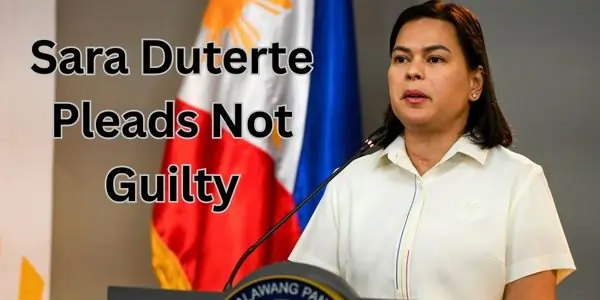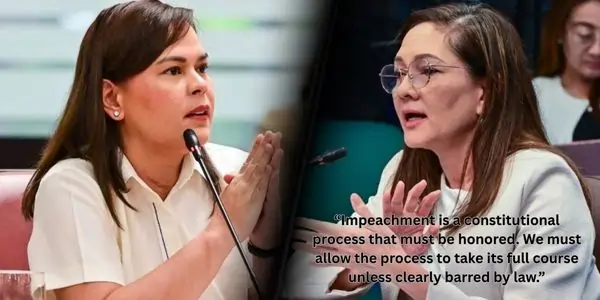Duterte formally pleads not guilty to impeachment charges and files a motion for impeachment dismissal, questioning its legal basis and constitutionality.

Sara Duterte Pleads Not Guilty, Seeks Dismissal of Impeachment Complaint
Vice President Challenges Legitimacy of Charges in Senate Submission
Manila, Philippines — Vice President Sara Duterte has officially pleaded not guilty to the impeachment charges filed against her, while simultaneously seeking the dismissal of the case. In a formal response submitted to the Senate sitting as the impeachment court, Duterte labeled the accusations against her as baseless, unconstitutional, and politically motivated.
The 34-page answer was filed on Monday, June 24, and includes a direct request for Sara Duterte impeachment dismissal, citing a lack of legal and factual grounds. Duterte emphasized that the complaint relied on assumptions and exaggerated claims, failing to meet the threshold required for impeachment under the Constitution.
Her legal team argued that the case violates the one-year prohibition against multiple impeachment complaints and questioned the jurisdiction of the Senate, stating that the complaint did not follow proper constitutional procedures.
The Impeachment Charges at a Glance
The impeachment complaint against Duterte includes serious allegations such as the misuse of confidential and intelligence funds, failure to perform constitutional duties, and allegedly plotting to remove President Ferdinand “Bongbong” Marcos Jr. from office.
The charges also point to Duterte’s controversial use of P125 million in confidential funds within a span of 11 days during her time as vice president. Furthermore, she is accused of neglecting her duties as Secretary of the Department of Education and allegedly participating in destabilization plots against the president.
These allegations form the basis of the complaint filed by several individuals, including lawmakers and civil society groups, who argue that Duterte’s conduct is not only improper but also in violation of the Constitution.
However, in her plea for Sara Duterte impeachment dismissal, the vice president refuted these claims, calling them a “scrap of paper” filled with speculation rather than substantive evidence.
Focus on Constitutionality and Legal Process
In the same filing, Duterte’s camp stressed that this is the fourth impeachment complaint lodged against her within the past 12 months. Citing Article XI, Section 3(5) of the Constitution, Duterte’s team claims that entertaining more than one impeachment complaint within a year is unconstitutional, making the current case void from the start.
Her lawyers also pointed out that the Senate had already taken steps to return the case to the House of Representatives in an earlier session, which, according to them, further complicates the jurisdictional standing of the impeachment trial.
“This impeachment complaint should be dismissed outright, as it is a blatant disregard for constitutional safeguards. The grounds presented do not rise to the level of an impeachable offense,” the filing stated.
Despite the plea for Sara Duterte impeachment dismissal, the prosecution insists that the Senate has the authority to proceed and that the case must be heard in full.
Senators and Legal Experts React
Following Duterte’s motion, reactions from senators and legal experts have been mixed. Some lawmakers believe the motion to dismiss must be given serious consideration to avoid turning the impeachment process into a political circus. Others, however, argue that dismissing the case without a full trial would set a dangerous precedent.
Senator Risa Hontiveros emphasized the importance of transparency, saying, “Impeachment is a constitutional process that must be honored. We must allow the process to take its full course unless clearly barred by law.”

Meanwhile, legal analysts noted that the Sara Duterte impeachment dismissal plea highlights the recurring tension between legal technicalities and political accountability. According to constitutional law professor Jose Santos, “The motion to dismiss is a legitimate move, but it places the Senate in a delicate position. If they dismiss prematurely, critics will call it a cover-up. If they proceed, it may be viewed as politically motivated.”
House Prosecutors Prepare for Rebuttal
The House of Representatives, which endorsed the complaint, has been given five working days to submit a formal reply to Duterte’s motion. This deadline may extend to June 30 due to the weekend. In their anticipated response, the prosecutors are expected to insist on the sufficiency of the complaint and the validity of the Senate trial.
A lead prosecutor in the case, who asked not to be named, said, “We are confident that we followed the correct process. The Senate must hear the evidence, and the people deserve to know the truth. The Sara Duterte impeachment dismissal plea is just an attempt to escape accountability.”
The prosecution panel is also coordinating with other complainants to bolster their arguments against Duterte’s claims of constitutional violation and procedural errors.
Political Ramifications and Public Perception
The impeachment case comes at a politically sensitive time, as Vice President Duterte is widely seen as a potential contender in the 2028 presidential race. Her popularity remains strong in many parts of the country, especially in Mindanao, where she served as mayor of Davao City.
Observers believe the push for Sara Duterte impeachment dismissal is also an effort to neutralize political damage that the case could inflict. A conviction would permanently disqualify her from holding public office, a devastating blow to any future presidential ambitions.
However, public opinion remains divided. Some view the impeachment as necessary to hold public officials accountable, while others see it as a targeted political attack aimed at dismantling Duterte’s growing influence.
On social media, #SupportSara and #ImpeachSara trended side by side as Filipinos expressed their views on the proceedings.
Supreme Court Petition Adds Legal Layer
In a separate move, Duterte’s legal team also elevated the matter to the Supreme Court. The petition, filed earlier in June, asks the high court to rule on the constitutionality of the multiple impeachment complaints filed within one year.
This additional legal battle may further delay the Senate’s proceedings, or potentially halt the trial altogether if the Supreme Court rules in Duterte’s favor.
Legal experts suggest that a Supreme Court ruling could become a landmark decision, clarifying key aspects of impeachment law that remain vague or open to interpretation.
What Happens Next?
With the Sara Duterte impeachment dismissal motion now formally submitted, the Senate awaits the House’s reply before making a decision. The Senate may either uphold Duterte’s plea and dismiss the complaint or push forward with a full-blown trial.
Senate President Chiz Escudero has stated that the chamber will follow due process and give both parties equal opportunity to present their positions. “We will proceed based on the merits of the arguments. This is not just a political issue; it is a matter of constitutional duty.”
As the nation watches closely, the outcome of the impeachment proceedings will not only determine the political fate of Vice President Duterte but may also redefine the balance of power between branches of government.
Conclusion
The plea for Sara Duterte impeachment dismissal has added a new chapter to the ongoing political drama unfolding in the country. With legal, constitutional, and political dimensions all in play, the coming days will be critical in determining whether this complaint is dismissed or escalates into one of the most high-profile trials in recent history. For now, all eyes remain on the Senate and the Supreme Court, as the Vice President defends her position and political future.
Follow us for more!
